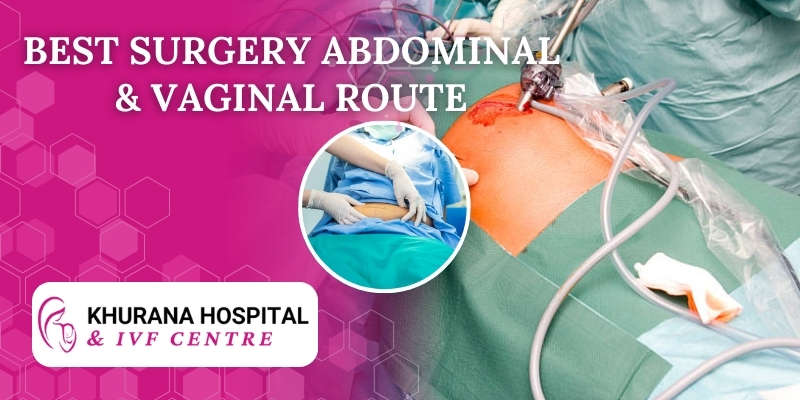Surgery Abdominal & Vaginal Route
- Home
- Gynaecology
- Surgery Abdominal & Vaginal Route

At Khurana Hospital and IVF Centre, we offer advanced surgical treatments for a variety of gynecological conditions, performed through both abdominal and vaginal routes. Whether you need surgery for benign conditions, reproductive health issues, or more complex gynecological problems, our expert surgical team is here to provide the best care possible.
Understanding Abdominal and Vaginal Surgery
Gynecological surgeries can be classified into two major types based on the method used to access the affected area:
-
Abdominal Surgery: Involves making an incision in the abdomen to access the uterus, ovaries, fallopian tubes, and other reproductive organs. This method is typically used for larger or more complicated conditions.
-
Vaginal Surgery: This involves accessing the reproductive organs through the vagina. Vaginal surgery is less invasive and generally involves a quicker recovery time compared to abdominal surgery.
Both types of surgeries are essential tools in treating a wide range of gynecological conditions, with the choice of method depending on the condition, the patient’s overall health, and the surgeon’s expertise.
Common Conditions Treated with Abdominal and Vaginal Surgery
-
Uterine Fibroids
- Abdominal or vaginal surgery may be required to remove fibroids that are causing pain, heavy bleeding, or infertility.
-
Endometriosis
- For severe cases of endometriosis, surgery may be needed to remove the excess tissue, whether through an abdominal or vaginal route.
-
Pelvic Organ Prolapse
- Vaginal surgery is often used to correct pelvic organ prolapse, where the uterus, bladder, or rectum drops into the vaginal canal.
-
Ovarian Cysts
- Large or symptomatic ovarian cysts may require removal through either abdominal or vaginal surgery.
-
Cervical and Uterine Cancer
- In cases of cancer, both abdominal and vaginal routes may be used for hysterectomy procedures, depending on the extent and location of the cancer.
-
Pelvic Inflammatory Disease (PID)
- Chronic PID that does not respond to medical treatment may require surgery to remove damaged tissue.
Abdominal Surgery Options
-
Hysterectomy (Abdominal)
- A surgical procedure to remove the uterus, performed through an incision in the abdomen. It is commonly performed for conditions like uterine cancer, fibroids, or endometriosis.
-
Oophorectomy
- Removal of one or both ovaries, typically performed for ovarian cysts, cancer, or other ovarian-related issues.
-
Myomectomy
- Removal of uterine fibroids while preserving the uterus. This procedure is done abdominally if the fibroids are large or located in hard-to-reach areas.
-
Salpingectomy
- Removal of one or both fallopian tubes, often performed in cases of ectopic pregnancy, infection, or cancer.
-
Laparoscopic Surgery
- In some cases, minimally invasive laparoscopic techniques are used through small incisions in the abdomen. This technique reduces recovery time and minimizes scarring.
Vaginal Surgery Options
-
Vaginal Hysterectomy
- The uterus is removed through the vagina, offering several advantages such as smaller incisions, quicker recovery, and reduced blood loss.
-
Pelvic Organ Prolapse Repair
- Vaginal surgery is commonly used to treat prolapsed organs, where the bladder, uterus, or rectum drops into the vaginal canal. The surgery restores the position of these organs and supports their proper function.
-
Colporrhaphy
- A procedure to repair the vaginal walls when they have been weakened by prolapse. This is usually done through the vaginal route to restore normal function.
-
Cervical Surgery
- Surgical treatment for cervical conditions like cervical cancer, dysplasia, or other abnormalities may be performed vaginally, depending on the case.
Benefits of Vaginal Surgery
- Less Invasive: Vaginal surgery generally requires smaller incisions, which means less trauma to the body and a quicker recovery.
- Shorter Hospital Stay: Most vaginal surgeries can be done on an outpatient basis or with a shorter hospital stay.
- Reduced Scarring: Since the procedure is performed through the vagina, there is no visible scarring.
- Quicker Recovery: Recovery time for vaginal surgeries tends to be faster than abdominal procedures, allowing patients to return to normal activities sooner.
Benefits of Abdominal Surgery
- Access to Larger Area: For more complicated or extensive conditions, abdominal surgery provides a wider area of access to the organs.
- Better Visualization: In some cases, abdominal surgery allows the surgeon to see the organs more clearly, which is critical for treating certain conditions like cancer.
- Effective for Large Growths or Cysts: Abdominal surgery is often preferred when dealing with larger tumors, fibroids, or ovarian cysts that cannot be removed through the vaginal route.
